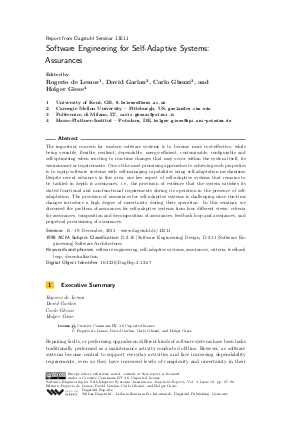Software Engineering for Self-Adaptive Systems: Assurances (Dagstuhl Seminar 13511)
Authors Rogerio de Lemos, David Garlan, Carlo Ghezzi, Holger Giese and all authors of the abstracts in this report
-
Part of:
Issue:
Dagstuhl Reports, Volume 3, Issue 12
Part of: Volume: Dagstuhl Reports, Volume 3
Part of: Journal: Dagstuhl Reports (DagRep) - License:
 Creative Commons Attribution 3.0 Unported license
Creative Commons Attribution 3.0 Unported license
- Publication Date: 2014-03-31
File

PDF
DagRep.3.12.67.pdf
- Filesize: 0.75 MB
- 30 pages
Document Identifiers
Subject Classification
Keywords
- software engineering
- self-adaptive systems
- assurances
- criteria
- feedback loop
- decentralization
Metrics
- Access Statistics
-
Total Accesses (updated on a weekly basis)
0PDF Downloads0Metadata Views
Abstract
The important concern for modern software systems is to become more cost-effective, while being versatile, flexible, resilient, dependable, energy-efficient, customisable, configurable and self-optimising when reacting to run-time changes that may occur within the system itself, its environment or requirements. One of the most promising approaches to achieving such properties is to equip software systems with self-managing capabilities using self-adaptation mechanisms. Despite recent advances in this area, one key aspect of self-adaptive systems that remains to be tackled in depth is assurances, i.e., the provision of evidence that the system satisfies its stated functional and non-functional requirements during its operation in the presence of self-adaptation. The provision of assurances for self-adaptive systems is challenging since run-time changes introduce a high degree of uncertainty during their operation. In this seminar, we discussed the problem of assurances for self-adaptive systems from four different views: criteria for assurances, composition and decomposition of assurances, feedback loop and assurances, and perpetual provisioning of assurances.
Cite As Get BibTex
Rogerio de Lemos, David Garlan, Carlo Ghezzi, and Holger Giese. Software Engineering for Self-Adaptive Systems: Assurances (Dagstuhl Seminar 13511). In Dagstuhl Reports, Volume 3, Issue 12, pp. 67-96, Schloss Dagstuhl – Leibniz-Zentrum für Informatik (2014)
https://doi.org/10.4230/DagRep.3.12.67
BibTex
@Article{delemos_et_al:DagRep.3.12.67,
author = {de Lemos, Rogerio and Garlan, David and Ghezzi, Carlo and Giese, Holger},
title = {{Software Engineering for Self-Adaptive Systems: Assurances (Dagstuhl Seminar 13511)}},
pages = {67--96},
journal = {Dagstuhl Reports},
ISSN = {2192-5283},
year = {2014},
volume = {3},
number = {12},
editor = {de Lemos, Rogerio and Garlan, David and Ghezzi, Carlo and Giese, Holger},
publisher = {Schloss Dagstuhl -- Leibniz-Zentrum f{\"u}r Informatik},
address = {Dagstuhl, Germany},
URL = {https://drops.dagstuhl.de/entities/document/10.4230/DagRep.3.12.67},
URN = {urn:nbn:de:0030-drops-45080},
doi = {10.4230/DagRep.3.12.67},
annote = {Keywords: software engineering, self-adaptive systems, assurances, criteria, feedback loop, decentralization}
}
